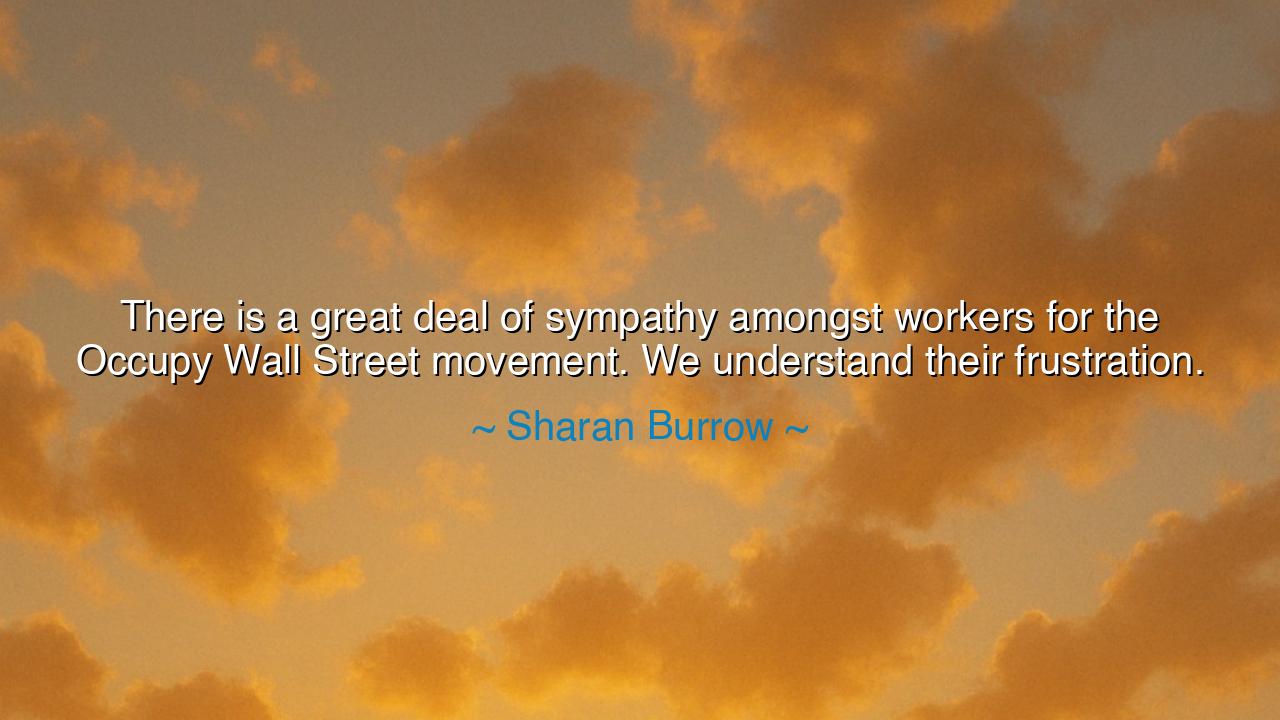
There is a great deal of sympathy amongst workers for the Occupy
There is a great deal of sympathy amongst workers for the Occupy Wall Street movement. We understand their frustration.






Children, gather close, for I bring you the wisdom of Sharan Burrow, whose words speak to the heart of our shared human struggles: "There is a great deal of sympathy amongst workers for the Occupy Wall Street movement. We understand their frustration." In these words, Burrow is speaking to a deep, universal truth—the bond that unites those who toil for their daily bread, and the shared frustration that comes when the system seems stacked against them. The Occupy Wall Street movement, with its cries for economic justice, resonated not just with the disillusioned few, but with many who labor tirelessly, seeking dignity and fairness in a world that often seems to reward only the privileged few.
In the ancient world, there was a wisdom that transcended time, echoing in the hearts of the workers and the masses. Consider the tale of the Roman plebeians, those common folk who labored under the weight of the ruling patricians. They, too, understood what it was like to feel as if the system was rigged against them. Yet, in their frustration, they found the strength to rise up, demanding rights and representation. The struggles of the plebeians were not just about the wealth that the ruling class hoarded, but about their dignity as human beings, deserving of respect and a fair share in the bounty of the land. In the same way, workers today, like those in the Occupy Wall Street movement, are not just seeking to change the distribution of wealth, but to assert their dignity, their right to a fair and just place in society.
The frustration that Burrow speaks of is not born from idle complaint, but from a deep sense of injustice. It is the frustration of those who labor, who sweat, who pour their effort into the work of the world, only to see the fruits of their labor gathered by those who exploit them. It is the frustration of the underdog, the oppressed, who see the structures of power as barriers to their advancement. Children, throughout history, the greatest revolutions—whether social, political, or economic—have arisen from this sense of injustice. The French Revolution, for example, was born from the anger of the common people, who had long been burdened by taxes, poverty, and the cruelty of a ruling elite. When the workers, the peasants, and the common folk rose up against the monarchy, it was not just a revolt against wealth but against the entire system that denied them their humanity.
Sharan Burrow is calling attention to the same timeless struggle. The Occupy Wall Street movement was not just a protest against the wealthy elite, but a call for recognition of the human dignity of the workers, the poor, and the marginalized. It was a cry for fairness in a system that often rewards greed and corruption, leaving those who work the hardest with the least. The sympathy that Burrow speaks of is not a mere feeling of pity, but a shared recognition of the frustrations that come when a person feels that their hard work is not being justly rewarded. It is an acknowledgment of the deep, shared human experience that drives people to demand not just better pay or conditions, but a better world—a world where effort and integrity are valued above privilege and oppression.
Now, children, listen closely to the lesson within these words. The frustration of the workers, whether in ancient Rome or in the modern world, is a reminder to all of us that justice cannot simply be a matter of laws and systems. It must be grounded in the recognition of each person’s worth, in the fairness of the system that binds us together. Just as the plebeians fought for their rights, and the French revolutionaries demanded a world of equality, so too must we stand for the human dignity of those who work, who strive, and who struggle. The world is built not by the wealthy, but by the workers—and when we fail to recognize their contribution, we fail to recognize the very heart of society.
So, children, as you go forward in your own lives, let these words guide you. Never allow the frustration of the workers to go unheard, nor let their dignity be trampled by systems that favor the few. Stand with those who labor, who struggle for fairness, and who seek to build a world where every person, regardless of their birth or wealth, can stand tall in the light of justice. The Occupy Wall Street movement and the struggles of the workers throughout history remind us that true greatness is not found in wealth, but in the strength and dignity of those who work for the good of all. Let us honor their efforts and, in doing so, honor the very soul of our shared humanity.






AAdministratorAdministrator
Welcome, honored guests. Please leave a comment, we will respond soon